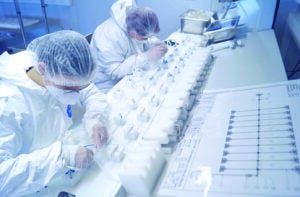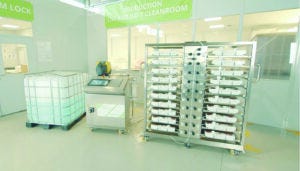Voices of Biotech
Podcast: MilliporeSigma says education vital to creating unbreakable chain for sustainability
MilliporeSigma discusses the importance of people, education, and the benefits of embracing discomfort to bolster sustainability efforts.
October 20, 2022
Sponsored by Single Use Support

Production of custom-design single-use assemblies for fluid management.
Most biopharmaceuticals are manufactured in large-scale stainless-steel piping and vessels, with downstream processes taking place within rigid and inflexible facilities. Although process steps such as harvest, purification, fermentation, filtration, dispensing, and freezing require flexibility, stainless steel has not been replaced yet by single-use systems at a large scale. However, manufacturers wanting to optimize process efficiency and scalability to obtain a viable and valuable product for commercial use inevitably will need single-use technology. Aseptic fluid management with single-use systems offers numerous immediate benefits and enables automated workflows. Such systems enable biomanufacturers to move toward advanced manufacturing.
Full Flexibility with Single-Use Systems
Implementing single-use systems in downstream processing enables flexible scale-up and facilitates process set-up. They are applicable to different manufacturing configurations, and single-use bioprocess containers and assemblies can be applied for different applications —regardless of process requirements and scales, manufacturing sequences, and type of drug products.
The need for process flexibility is the primary reason why contract manufacturing organizations (CMOs) and contract development and manufacturing organizations (CDMOs) are implementing single-use systems. These systems adapt to manufacturing requirements for antibody–drug conjugates (ADCs), monoclonal antibodies (MAbs), mRNA, viral vectors for cell and gene therapy, and other biopharmaceuticals at different scales. Moreover, single-use components accompany liquids throughout all process steps. Protecting the use of product-contact equipment reduces contamination risk and is important for regulatory compliance. Implementing the same single-use solutions at different scales establishes scalable reproducibility — from clinical studies with milliliter volumes to commercial production with batch sizes of hundreds of liters. Following standardized process steps also facilitates current good manufacturing practice (CGMP) processing.
Single-use systems are the logical process solutions for cell and gene therapy manufacturers under strict timelines from starting materials to drug product administration. For some therapies, drug-substance processes such as material handling, product filling, freezing, storing, and shipping can be accelerated on demand. With short turnaround times until administration to patients, reliable cold-chain logistics are important.
Implementing single-use systems eliminates cleaning and validation steps, saving time on site. That includes time required to clean hard pipes and vessels, operator time, and time for performing cleaning analysis. Saving time improves process efficiency. Studies also have shown that the costs saved by combining single-use technologies (for filtration, filling, and freezing) and sterile consumables quickly can offset the capital costs of implementing single-use technologies (1).
Capital expenditures for the installation of new single-use technologies should be evaluated. However, the greatest long-term influences on costs are operating expenses. With a process-efficient manufacturing workflow and low volatility, costs are amortized within a few months.
Sustainability has become an increasingly important factor in the decision to implement single-use systems. Sustainable solutions are preferred, and studies have shown that facilities using single-use systems have improved sustainability over facilities based on stainless-steel systems. Despite plastic disposal concerns, single-use systems are less harmful to the environment mainly because no water, energy, and chemicals are required to ensure sterility from batch to batch on site (2).
Supply-chain difficulties during the COVID-19 pandemic brought on a drastic shortage of single-use equipment. Manufacturers could not secure business continuity with some manufacturing divisions. Consequently, suppliers expanded their production facilities to supply the industry with the components it needs. Nevertheless, from now on, biomanufacturers will be taking a close look at their suppliers’ contingency plans. Biomanufacturers need reliable partners that can guarantee consistent availability of single-use equipment with short lead times in all eventualities.
Throughout the pandemic, Single Use Support GmbH was the only supplier that was able to deliver customized single-use assemblies within a few weeks. Services ranged from design to delivery of sterilized manifold systems for fluid management.
Increased Efficiency with Automated Filling
Some bottlenecks in downstream processing are caused by inefficient and manual processes that require multiple steps. They can lead to human errors and product loss. For advanced therapy medicinal products in particular, handling cell material for allogeneic therapies requires rapid filling processes at commercial scale to enable large batch sizes without loss of cell viability.
Automated systems can facilitate fluid management and increase process flexibility. When combining automation and single-use systems, consider the following factors.
Scalable Batch Size: The volumes of process fluids range from a few milliliters for clinical trials or for autologous cell therapies to hundreds of liters for buffer solutions at commercial scale (e.g., for viral vectors and vaccine production). Single-use technologies can be adapted accordingly to increase throughput and filling accuracy.
Size of Single-Use Bioprocess Containers: Small single-use bags must be filled more accurately than large bags can be. To prevent the risk of breakages from over- or underfilling, the maximum deviation is 1 g for filled small single-use bags with volumes <100 mL.
Hybrid for Primary Packaging: Biomanufacturers are changing from rigid containers (e.g., bottles) to single-use bags. Hybrid platform solutions can be used to dispense materials into different primary packaging options. They also support the complete switch to single-use bags.
Integrated Sealing: After fluids are filled into single-use bags, it is common practice to separate a bioprocess container manually from the single-use assembly — either with an aseptic disconnector or by crimping. Both methods must be incorporated in the design of a single-use assembly before sterilization, and both processes are vulnerable to human error. Novel innovations combine those process steps by integrating stepper and sealer pinch valves. Thus, the automated stepper and sealing pinch valves regulate (and accelerate) filling rate and seal and separate bags from a manifold in a fully automated process.

Automated aseptic filling of drug substance into single-use bioprocess containers using a RoSS.FILL system.
Takeaways
Downstream processing requires maximized flexibility and scalability to prepare for future process set-ups. Biomanufacturers are transitioning from bottles to single-use bags for primary packaging. However, despite the advantages provided by using single-use bioprocess containers, the industry still faces challenges of product loss because of the inevitable factor of human error.
Advanced biomanufacturing applies different solutions to minimize risk of product loss and optimize efficiency of process steps. The implementation of shells for single-use bags protects drug substances and other liquids from damage during handling. Fill–filtration platforms for dispensing drug substances already offer different levels of automation to decrease the need for manual operations.
References
1 Single Use Support, Case Study: Reducing Product Loss — Process Independence, August 2022; https://www.susupport.com/company/news/news/case-study-reducing-product-loss_process-independence.
2 Budzinski K, et al. Streamlined Life Cycle assessment of Single-Use Technologies in Biopharmaceutical Manufacture. New Biotech. 68, 2022: 28–36; https://doi.org/10.1016/j.nbt.2022.01.002.
Mike Marciniak is senior director business development US at Single Use Support GmbH, Endach 36, 6330 Kufstein, Austria; [email protected]; https://www.susupport.com.
You May Also Like